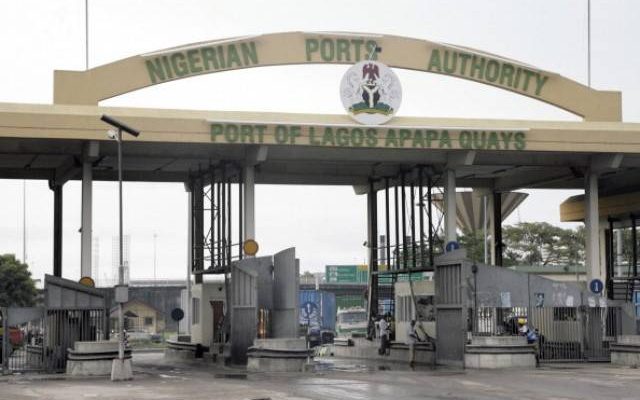The reform initiatives of the Dr. Abubakar Dantsoho-led management of the Nigerian Ports Authority (NPA) are laying a solid foundation for Nigeria to take another shot at the Category C forum of the International Maritime Organization (IMO), while also deploying the Ètò, Electronic Barrier Systems to resolve the Apapa traffic gridlock that resurfaced recently in pursuance of government’s ease of doing business goals
By Edu Abade
As maritime nations prepare for election into the crucial Category C of the International Maritime Organization this month, the Nigerian Ports Authority has laid a solid foundation for Nigeria to clinch the coveted seat to further deepen and boost its rating and opportunities in the Blue and Marine economy sector.
The criteria for the seat are the modernization of Nigerian Ports and standards of operations (ease of doing business) in recent times, which Dr. Abubakar Dantsoho’s current Port Modernization Initiatives have already placed Nigeria on the verge of being elected into the prestigious Category.

Under the port modernization initiatives, the significant areas of progress have become noticeable, including the surge in revenue being generated by the NPA under Dantsoho’s watch, the revival of the Eastern Ports to free up the Lagos Ports, the Port Automation, the National Single Window (NSW) platform, promotion of non-oil exports, as well as the redistribution of maritime traffic.
Various other results of the reforms and accomplishments include Dantsoho’s election as the first Nigerian President of the Port Management of West and Central Africa (PMWCA), second Nigerian Vice President of the International Association of Ports and Harbours (IAPH) and his unprecedented stakeholders’ engagement.
Other concrete evidence of NPA management reforms and accomplishments are manifest in the area of Human Resources Development in ensuring backlog promotions of qualified staff members, who have written their promotion examinations.
Dantsoho’s leadership at the NPA has also excelled in pursuing the Port Community System (PCS), aimed at the modernization and digitization of the nation’s ports in conjunction with the IMO to enshrine best practices and transparency, a crucial step towards the actualization of the national Single Window (NSW) germane to the digital transformation, trade facilitation, global competitiveness in meeting the dictates of the facilitation of Integrated Maritime Traffic Convention.
These in turn stimulate and increase revenue generation. There are several other benefits the NPA reforms are yielding to Nigeria, which are helping the nation’s economic growth and adding flesh to the Federal Government’s pursuit of the welfare of citizens.
Meanwhile, contrary to reports sponsored by some entrenched interests in a bid to return the port access roads to the dark days, the NPA in collaboration with Trucks Transit Parks (TTP) has deployed the Ètò, Electronic Barrier Systems to salvaged Apapa traffic gridlock, thereby recording major improvements in port traffic management across all terminal access points within the Lagos Port Complex.
At the peak of the Apapa traffic gridlock in 2018 and 2019, measures put in place to resolve the perennial problem failed until the NPA and TTP introduced the Electronic Call-Up System also known as Ètò. Despite initial resistance by entrenched interests, the NPA stood its ground and enforced the system. Since then, sanity has largely returned with commuters and residents who ply the roads on a daily basis applauding the NPA.

The Ètò Electronic Call-Up System, developed and managed by Trucks Transit Parks Limited, is a digital truck scheduling and access management platform designed to streamline traffic into and out of Nigerian ports.
Electronic barrier systems at port access roads offer enhanced security, improved traffic management, increased efficiency, and significant cost savings. By replacing or supplementing manual processes, Ètò has provided a more reliable and modern solution for controlling and monitoring port entry points.
To implement the electronic call-up system, the NPA, in collaboration with the Lagos State Government and other relevant stakeholders, developed about 29 truck parks across Lagos State.
All of the 29 truck parks have fully deployed the Eto infrastructure, which includes automated gating systems and other Information and Communication Technology (ICT) equipment.
The electronic call-up has been able to streamline cargo evacuation and truck movements, thereby bringing a level of sanity to the roads.
Apart from a few isolated cases where some truck drivers try to subvert the system by not adhering strictly to the truck manifest requirement, the electronic call-up has brought sanity to Apapa.
Aside from the call-up system, the NPA also started enforcing the use of railways in the movement of import and export cargoes in and out of states in the hinterland.
Recently, a Kano-based exporter moved about 100 tons of millet direct from Kano to Lagos Port via rail. The rail also had passengers on board the coaches.
An exporter who pleaded anonymity with Tentacle said, “I spent almost 50 per cent less as haulage cost to move my millets in containers from Kano Railway Station to Lagos Port. If these cargoes are to be moved by trucks, the goods worth millions of Naira, would have cost me more.”
In addressing long-standing challenges, the NPA has embarked on the promotion of multimodal transport systems through the use of railways and barges for the movement of cargo in and out of the ports, a development that has tremendously reduced congestion at most terminals at the ports, thereby helping to improve ports efficiency.
Also an official of NPA, noted, “Many barge operators have been licensed by the authority in order to ensure effective and safe operation. A regulatory framework has also been developed, which looks into the state of the barges being deployed.
“When we approved the deployment of the barges, we discovered that many of them did not have communication equipment and we directed them to install such equipment. We also insist that these barges must be seaworthy before they are allowed to sail in order to forestall a situation where they break down at the middle of the channels, which could cause disruptions.”
Also, the NPA introduced a new policy for the management of empty containers. This policy compels shipping lines to take back at least 80 percent of the loaded containers that they came with for every voyage in empties and export cargo.
Reacting to a recent report by fifth columnists who took sides with entrenched interests who wanted to sabotage the system and return the ports access roads to the dark days, the NPA said it has, in collaboration with Trucks Transit Parks, recorded major improvements in port traffic management following the full deployment of electronic barrier systems in all terminal access points within the Lagos Port Complex.
The system, which became fully operational in September 2025, is now a key part of daily port operations, ensuring that only authorized trucks with valid Ètò-issued call-up tickets can access designated terminals. Integrated with the Ètò Electronic Call-Up System, the barriers have added a new layer of physical enforcement to digital scheduling, strengthened gate control, improved traffic coordination, enhanced the accuracy of port data, and overall traffic flow within the port.
Before the deployment of the integrated barrier system, the port operations were hampered by unauthorized truck diversions between terminals, with vehicles crossing from one terminal to another outside their scheduled bookings, idle trucks lingering in the port area seeking unscheduled jobs and congestion caused by non-compliance with standard operating procedures.
The barrier system has effectively closed these loopholes, providing a robust physical enforcement layer for the Ètò platform. Each barrier automatically lifts only for trucks with verified call-up tickets assigned to a specific terminal, ensuring that all movements are scheduled, controlled, and traceable.
On enhanced control and data integrity, the NPA, maintained that the deployment of electronic barriers represents a major leap in its automation of port operations.
General Manager, Operations at NPA, Mrs. Stella Oladiran, said, “For years, unauthorized truck movements and human interference undermined efficiency in port operations. With the barrier system now active, we have end-to-end control from the point of booking to terminal access and exit.
“Key benefits already recorded include improved end-to-end control of the electronic call-up process, from booking to terminal exit, data integrity and accuracy in tracking port traffic and truck movements, transparent monitoring of inter-terminal traffic for better accountability and enhanced port productivity and efficiency through precise truck scheduling.
Explaining how the system works, the Authority that disclosed that each terminal gate has been equipped with a fully automated electronic barrier connected to the Ètò platform and as such, trucks with valid Ètò tickets are automatically verified and granted access.
Unauthorized trucks are denied entry, eliminating manual checks and reducing human interference. The system provides real-time data on every truck’s entry, exit and inter-terminal movement, enabling better coordination across the entire logistics chain.
Reacting to the initiative, stakeholders have denounced the reports of resurgence of gridlock on port access roads as Port Manager, Lagos Port Complex, Mr. Adebowale Lawal said the NPA, in line with its mandate to ensure the smooth operation of port activities and the free flow of traffic around the Apapa Port Complex Corridor remains committed to maintaining order and preventing any recurrence of the severe gridlock previously experienced along the access roads.
“We have recently undertaken a review and enhancement of the ETO system, which now integrates Terminal Gates directly with the ETO platform. The integration is designed to provide a structured sequencing of truck movements, both inbound and outbound within the Apapa Port Complex. The objective of the initiative is to ensure transparency, improve traffic efficiency, and maintain a sustainable operating environment around the ports.
“However, the success of this system depends largely on the cooperation and compliance of all Stakeholders, including Terminal Operators, Transport Unions, Drivers, Clearing Agents and Government Agencies at the Federal and state levels.
“Sequencing truck entry and exit is not rocket science. With sincerity of purpose and commitment from all concerned, we can achieve and maintain orderliness and prevent a return to the chaotic conditions of the past. It is in our best interest, because smooth Ingress and Egress of Trucks will, in the long run, bring about high turnover for all Stakeholders,” he stated.
On his part, the Chairman of the Association of Maritime Truck Owners (AMATO), Remi Ogungbemi said, “Our attention has been drawn to some misleading media reports alleging that gridlock has returned to the Apapa port corridor due to a collapse of the electronic call-up system.
“We wish to categorically state that such reports are false, exaggerated, and do not reflect the true situation on ground. All the road arteries leading to the Apapa Port-including Wharf Road, Creek Road, and other adjoining routes-remain orderly and passable.
“At present, trucks are moving in a single, regulated lane towards their designated terminals within the port in compliance with traffic and safety directives. This organized movement should not be mistaken for gridlock. We, therefore, urge members of the public, port users and the media to disregard and debunk these unfounded rumours. The current traffic situation around the Apapa port corridor reflects improved discipline, better enforcement and enhanced cooperation among stakeholders.”
Speaking further, he said, “We remain committed to continuous collaboration with relevant government agencies, traffic management authorities, and terminal operators to sustain the gains achieved so far in port access management. We commend the efforts of all stakeholders who have contributed to ensuring the smooth flow of trucks and cargoes in and out of the port.”
In his intervention, General Manager of Corporate and Strategic Communications at NPA, Ikechukwu Onyemekara said the era of all forms of illegality of the past as it concerns truck accessing the ports is over, maintaining that meddlesome interlopers would always find a way to discredit the NPA and that the authority remains committed to its mandate of ensuring ports efficiency.
“The electronic call-up system is a global best practice, and in addition, with the electronic barrier being in place at all terminals, practices that encourage chaos along the port corridor will not be possible anymore. The NPA has been collaborating and will continue to engage all stakeholders who are genuinely committed to the growth of the maritime industry and the nation at large to ensure an efficient port system,” he said.




